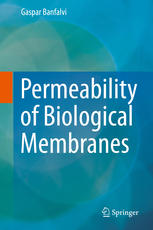

Most ebook files are in PDF format, so you can easily read them using various software such as Foxit Reader or directly on the Google Chrome browser.
Some ebook files are released by publishers in other formats such as .awz, .mobi, .epub, .fb2, etc. You may need to install specific software to read these formats on mobile/PC, such as Calibre.
Please read the tutorial at this link. https://ebooknice.com/page/post?id=faq
We offer FREE conversion to the popular formats you request; however, this may take some time. Therefore, right after payment, please email us, and we will try to provide the service as quickly as possible.
For some exceptional file formats or broken links (if any), please refrain from opening any disputes. Instead, email us first, and we will try to assist within a maximum of 6 hours.
EbookNice Team

Status:
Available4.4
10 reviewsThis book deals with biological membranes, focuses on permeabilization and pays particular attention to reversible permeabilization to maintain the viability and physiological conditions of the cells.
Selective permeability of biological membranes also known as semipermeability, partial permeability or differential permeability allows molecules to diffuse, pass by passive and active or by other types of transport processes mediated by proteins.
The first chapter of the book deals with the composition of biological membranes, characterizes cellular membranes of prokaryotic, eukaryotic cells, membranes of cellular organelles and the function of biological membranes. The second chapter provides an overview of bilayer permeability, selectivity of permeabilization and cellular transport processes. Chapter 3 overviews different cell manipulations that aim to make cells permeable while maintaining not only the structural but also the functional integrity of cells. The last chapter deals with applications, particularly with reversible permeabilization to study macromolecular (DNA, RNA, poly-ADP ribose) biosynthetic processes, replication, gene expression, visualization of replicons, intermediates of chromosome condensation, genotoxic chromatin changes, upon treatment with heavy metals and different types of irradiation.
The interdisciplinary aspects of the book contribute to the understanding of the structure of nucleic acids, replicative intermediates, Okazaki fragments, RNA primer mechanism, subphases of replication and repair synthesis, replicons, gene expression, chromosome condensation generated a wealth of information that will attract a wide readership. The natural audience engaged in DNA research, including genetics, cell and molecular biology, chemistry, biochemistry, medicine, pharmacy will find essential material in the book.